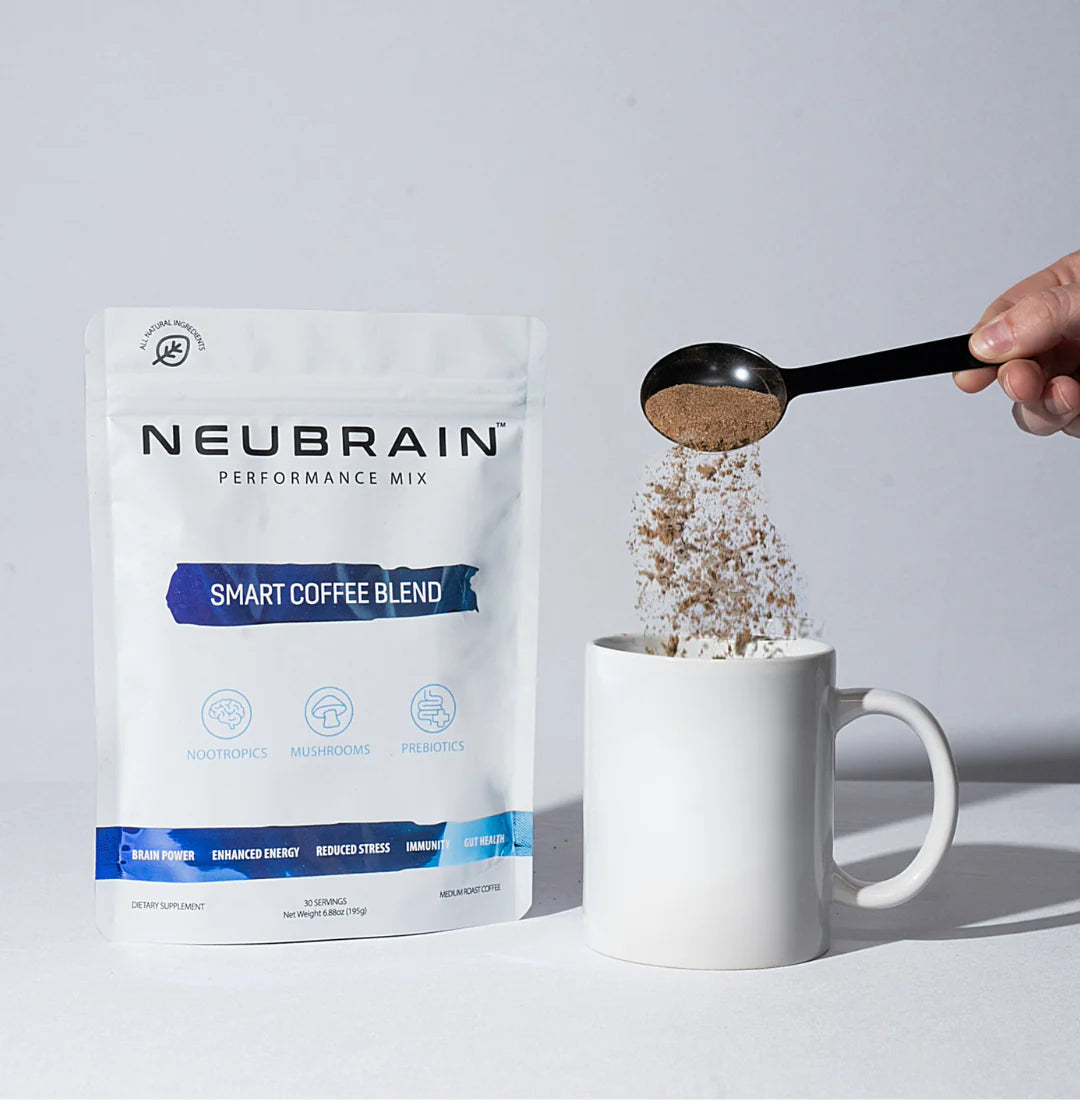1) What is the gut–brain axis?
The gut–brain axis is a two-way communication network linking the gastrointestinal tract and the central nervous system. The gut is often called the “second brain” because it produces and responds to many of the same neurotransmitters as the brain (e.g., serotonin, GABA) and sends a continuous stream of status updates through the vagus nerve, our primary parasympathetic “rest-and-digest” pathway. NHMRC
Several pathways carry these signals:
-Neural: The vagus nerve carries sensory information from your gut to brain regions that regulate mood and arousal.
-Immune: Gut microbes help calibrate the immune system; when the gut lining is irritated or “leaky,” pro-inflammatory cytokines can influence brain function and mood.
-Endocrine & Neurotransmitters: Microbes synthesize or modulate neurotransmitters and precursors (e.g., serotonin, dopamine, GABA, acetylcholine). PMCMDPI
-Microbial metabolites: Short-chain fatty acids (SCFAs) like butyrate—produced when microbes ferment fiber—can cross into circulation and affect brain and immune function. PMC
When this system is balanced, people tend to report more stable mood, better stress tolerance, and clearer thinking. When it’s out of balance (dysbiosis), research links it with higher rates of anxiety, low mood, and stress-related symptoms. PMC+1
2) What does the evidence say about mood benefits?
A growing number of randomized trials and mechanistic studies point to meaningful mental-health benefits from supporting the gut.
A) Probiotics can reduce negative mood within two weeks
In 2025, researchers in the Netherlands ran an 88-person randomized, double-blind, placebo-controlled trial and found that a multispecies probiotic reduced daily negative feelings starting around week two, without blunting positive mood. That time course mirrors early antidepressant timelines—though researchers stress probiotics are not a replacement for clinical treatment. NaturePubMedUniversiteit Leiden
B) Psychobiotics & diet patterns
“Psychobiotics” are probiotics or prebiotics that influence brain function and behavior through the gut. Trials suggest psychobiotic diets can reduce perceived stress—one 4-week intervention showed a 32% reduction in perceived stress in the diet group vs. 17% in controls (trend level between groups; signal still notable). Nature
C) Fermented foods drive diversity and dampen inflammation
A 10-week fermented-foods diet at Stanford increased microbiome diversity and decreased inflammatory cytokines—a plausible route to better stress regulation and mood stability. Diversity is a core feature of a resilient gut ecosystem. Stanford MedicinePubMedCell
D) Mechanisms that connect the dots
Microbes produce and modulate neurotransmitters (serotonin, GABA, acetylcholine), interact with the vagus nerve, and generate SCFAs that help maintain the gut barrier and regulate immune activity—each step carries implications for anxiety and depressive symptoms. PMCMDPI
Plain-English takeaway: feed your microbes → strengthen the gut lining → calm immune noise → smoother signaling to your brain → better mood and focus.
3) Diet & habit playbook for a microbiome that supports mental health
Think of the following as levers you can pull daily. None are magic by themselves—together, they push the system toward balance.
A) Fermented foods (daily or near-daily)
Yogurt, kefir, sauerkraut, kimchi, miso, tempeh, traditionally fermented pickles, natto, kombucha. In the Stanford trial, higher servings drove stronger responses in diversity and lower inflammation. Aim for 1–2 servings/day, rotating sources. Stanford MedicinePubMed
B) Prebiotic fiber (feed your beneficial microbes)
Soluble fibers (inulin, pectin) and resistant starches feed microbes that produce SCFAs. Foods: garlic, onions, leeks, artichokes, asparagus, oats, apples, beans, green bananas, cooled rice/potatoes. A variety-first approach tends to work better than a single supplement. PMC
C) Polyphenol-rich plants (and coffee!)
Colorful plants (berries, olives, cocoa), herbs/spices, and coffee supply polyphenols—many bypass early digestion and are transformed by gut bacteria into compounds with systemic effects. Reviews suggest coffee polyphenols and other non-digestible constituents (e.g., melanoidins) can modulate microbiota composition and function, with observational work showing distinct microbiomes in coffee drinkers. PMCFrontiersNature
D) Mushroom β-glucans (prebiotic polysaccharides)
Fruiting-body mushrooms contain β-glucans, fermentable fibers that promote beneficial bacteria, support gut barrier integrity, and increase SCFA production. Reviews highlight β-glucans as promising prebiotic fibers with immune-modulating effects. PMCMDPINature
E) Lifestyle “multipliers”
-Sleep regularity → stabilizes the microbiome and stress hormones.
-Movement → moderate exercise supports diversity and insulin sensitivity.
-Stress hygiene → breathwork, walks, sunlight, and social connection ease sympathetic “noise” that the gut otherwise “hears.”
Where Neubrain fits (without the hype)
Neubrain’s daily ritual was built for focus—but the way you get that focus can also support a microbiome-forward routine:
-Coffee polyphenols: Emerging evidence links moderate coffee intake with beneficial shifts in gut microbiota; polyphenols that reach the colon are transformed by microbes into bioactive metabolites. PMC+1MDPI
-Fruiting-body functional mushrooms (β-glucans): Our blend uses 100% fruiting body Lion’s Mane, Chaga, Reishi, Turkey Tail, and Cordyceps—polysaccharides here act as prebiotic fibers that can feed helpful microbes. MDPI
-Calm, productive energy: The L-Theanine + buffered caffeine profile helps you do the habits (cooking, walking, journaling) that anchor gut health.
-No sludge, real coffee taste: A ritual you’ll keep, because it tastes like coffee—not like compromise.
Explore the product and ingredients here, and see exactly how we stack up:
• Product page: https://drinkneubrain.com/products/smart-matcha-premium-starter-kit
• Competitor comparison: https://drinkneubrain.com/pages/mushroom-coffee-showdown
Sample 7-day “Psychobiotic” Routine (stackable with Neubrain)
Day 1–2
-Morning: Neubrain + bowl of berries + Greek yogurt (fermented + polyphenols).
-Lunch: Beans + greens bowl with olive oil and herbs (fiber + polyphenols).
-Evening: Sauerkraut or kimchi side. 10-minute walk + 5 minutes of nasal breathing.
Day 3–4
-Rotate fermented sources (kefir, miso soup).
-Add a green banana or cooled potato for resistant starch.
-Protect sleep window (wake time consistent).
Day 5–6
-Try oats (β-glucans) with seeds, cinnamon, and a spoon of kefir.
-Short strength session or brisk 30-minute walk.
Day 7
-Reflect: did mood/stress feel steadier? If yes, set subscription cadence so your ritual—and your microbes—have what they need.
Frequently asked (honest) questions
Is this a replacement for therapy or medication?
No. These are adjacent supports with promising evidence. Always involve your clinician for diagnosis, medication decisions, or moderate-to-severe symptoms.
Do I need probiotic capsules?
Not necessarily. Many people do well with fermented foods and prebiotic diversity first. Some strains/formulas help specific issues—work with a professional if you’re troubleshooting. PMC
Can coffee hurt my gut?
Very high intakes can be irritating for some; however, moderate coffee is associated with beneficial microbiota shifts and motility in multiple reviews. If you’re sensitive, try with food and lower-acid roasts, and keep volume modest.
Final word
Mental wellness doesn’t live in a single pill or hack—it lives in systems. Your microbiome is one of those systems. Feed it with fermented foods, prebiotic fibers, polyphenols, and β-glucans; support it with sleep, light, and movement; and make those habits frictionless with a morning ritual you enjoy.
That’s what Neubrain is designed for: calm, clear focus that makes it easier to do the daily things that make life feel better—from your gut, up.








